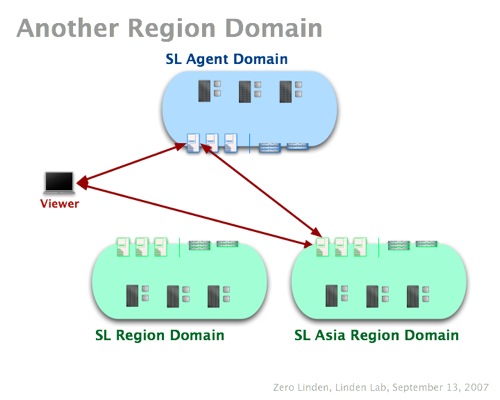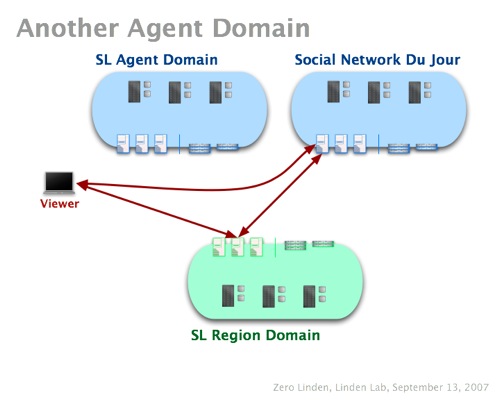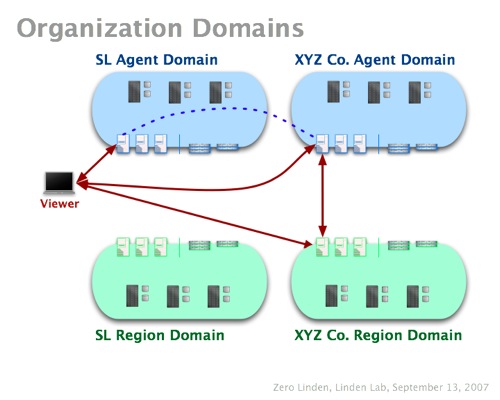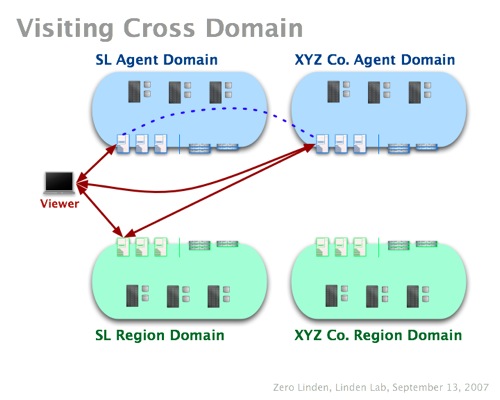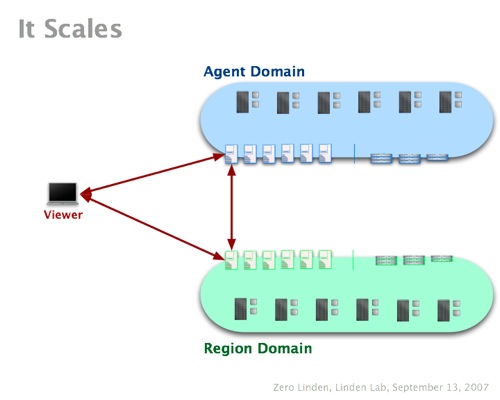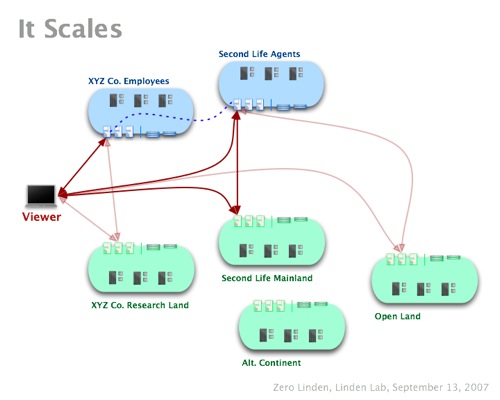Difference between revisions of "Multiple Domains"
Tao Takashi (talk | contribs) |
m (→See also) |
||
| (7 intermediate revisions by 4 users not shown) | |||
| Line 12: | Line 12: | ||
[[Image:SLGArchWG1-16-Another Agent.jpg]] | [[Image:SLGArchWG1-16-Another Agent.jpg]] | ||
Here another agent domain is added to the grid. It again creates questions such as whom to trust and how trust can be implemented. | |||
== Adding a Organization Domain == | == Adding a Organization Domain == | ||
| Line 18: | Line 18: | ||
[[Image:SLGArchWG1-17-Organization Domains.jpg]] | [[Image:SLGArchWG1-17-Organization Domains.jpg]] | ||
An Organization Domain means basically that it is restricted in some form. | An Organization Domain means basically that it is restricted in some form. In this case we have a company XYZ and it might allow only agents from their agent domain on the region domain. | ||
The blue dotted line means that an agent can be linked to another agent (e.g. the more public agent from the SL Agent domain (== Linden Lab's grid)). This can mean the following: | |||
* The company agent can access the inventory from the company agent domain and from the SL Agent Domain | |||
* The company agent might be restricted in only being allowed to rez objects from the company agent domain's inventory on a region belonging to the company region domain | |||
* The company agent might be allowed on th SL Region domain but might not be able to rez objects from agent domain of the company. | |||
* The company agent might be allowed to wear the company badge on the SL Region domain though (or not). | |||
So what we need here is a list of what should be restrictable and a means of how to define it. | |||
== How to link domains == | == How to link domains == | ||
| Line 28: | Line 37: | ||
[[Image:SLGArchWG1-19-It Scales 1.jpg]] | [[Image:SLGArchWG1-19-It Scales 1.jpg]] | ||
[[Image:SLGArchWG1-20-It Scales 2.jpg]] | [[Image:SLGArchWG1-20-It Scales 2.jpg]] | ||
In these two diagrams one can see how it can then scale in the future. There are no central databases anymore and it allows for adding arbitrary agent and region domains. | |||
Of course it also allows for a complete separate grid, it just depends on permissions on what is allowed to connect to what. | |||
== See also == | |||
* [[Proposed Architecture]] | |||
* [[Agent Domain]] | |||
* [[Region Domain]] | |||
* [[Central Services]] | |||
* [[Running at Home and Offline]] | |||
[[Category:Architecture Working Group]] | |||
[[Category:Grid_Interoperability]] | |||
Latest revision as of 15:39, 14 July 2008
Adding another Region Domain
This diagram shows how you can add another region domain to the grid. With this architecture it is quite straight forward but also imposes some questions about which region domain trusts which agent domain.
Zero says: what started as scaling exercise turns into distributed authority exercise
Adding Another Agent Domain
Here another agent domain is added to the grid. It again creates questions such as whom to trust and how trust can be implemented.
Adding a Organization Domain
An Organization Domain means basically that it is restricted in some form. In this case we have a company XYZ and it might allow only agents from their agent domain on the region domain.
The blue dotted line means that an agent can be linked to another agent (e.g. the more public agent from the SL Agent domain (== Linden Lab's grid)). This can mean the following:
- The company agent can access the inventory from the company agent domain and from the SL Agent Domain
- The company agent might be restricted in only being allowed to rez objects from the company agent domain's inventory on a region belonging to the company region domain
- The company agent might be allowed on th SL Region domain but might not be able to rez objects from agent domain of the company.
- The company agent might be allowed to wear the company badge on the SL Region domain though (or not).
So what we need here is a list of what should be restrictable and a means of how to define it.
How to link domains
How it might scale in both domain types
In these two diagrams one can see how it can then scale in the future. There are no central databases anymore and it allows for adding arbitrary agent and region domains.
Of course it also allows for a complete separate grid, it just depends on permissions on what is allowed to connect to what.
